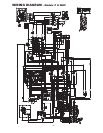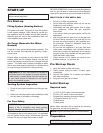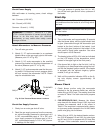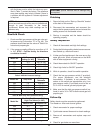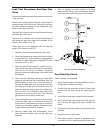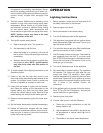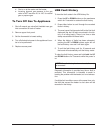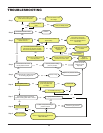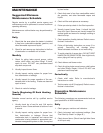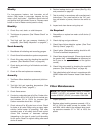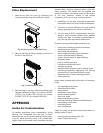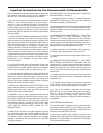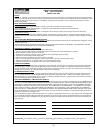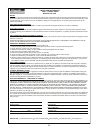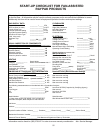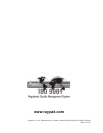
49
MAINTENANCE
Suggested Minimum
Maintenance Schedule
Regular service by a qualified service agency and
maintenance must be performed to ensure maximum
operating efficiency.
Maintenance as outlined below may be performed by
the owner.
Daily
1. Check that the area where the heater is installed
is free from combustible materials, gasoline, and
other flammable vapors and liquids.
2. Check for and remove any obstruction to the flow
of combustion or ventilation air to heater.
Monthly
1. Check for piping leaks around pumps, mixing
valves, relief valves, and other fittings. If found,
repair at once. DO NOT use petroleum-based
stop-leak compounds.
2. Visually inspect burner flame.
3. Visually inspect venting system for proper func-
tion, deterioration or leakage.
4. Visually inspect for proper operation of the con-
densate drain in the venting. If leaks are observed
repair at once.
5. Check air vents for leakage.
Yearly (Beginning Of Each Heating
Season)
Schedule annual service call by qualified service
agency.
1. Visually check top of vent for soot. Call service
person to clean. Some sediment at bottom of vent
is normal.
2. Visually inspect venting system for proper func-
tion, deterioration or leakage. Ensure that
condensate drain is inspected and ensure that
condensate is being directed to appropriate con-
densate management system or drain, as required
b
y local codes.
3. Check that area is free from combustible materi-
als, gasoline, and other flammable vapors and
l
iquids.
4
. Check air filter and replace as necessary.
5. Follow pre-start-up check in the Start-up section.
6. Visually inspect burner flame. It should be light
blue at full input. Remove and visually inspect hot
surface igniter and sensor for damage, cracking or
debris build-up.
7. Check operation of safety devices. Refer to manu-
facturers’ instructions.
8. Follow oil-lubricating instructions on pump (if re-
quired). Over-oiling will damage pump.
Water-lubricated circulators do not need oiling.
9. To avoid potential of severe burn, DO NOT REST
HANDS ON OR GRASP PIPES. Use a light touch;
return piping will heat up quickly.
10. Check blower and blower motor.
11. Check for piping leaks around pumps, relief valves
and other fittings. Repair, if found. DO NOT use
petroleum-based stop-leak.
Periodically
1. Check relief valve. Refer to manufacturer’s
instructions on valve.
2. Test low water cut-off (if equipped). Refer to manu-
facturer’s instructions.
Preventive Maintenance
Schedule
The following procedures are recommended and are
good practice for all MVB installations.
Daily
1. Check gauges, monitors and indicators.
2. Check instrument and equipment settings. (See
“Post Start-Up Check” on page 45.)
3. Check burner flame. (Should see light blue flame
at full input rate).



